Once the first granary in Taipei, No.1 Food Theater is a farm-to-table restaurant in Songshan District (松山) that may well be “No.1” in fusion and innovation too.
The granary was repurposed as a restaurant in 2013, 68 years after its construction. While the exteriors and interiors have been renovated, the building’s high ceiling remains. Its first floor retails the best of local organic produce; its second floor houses the restaurant.
Amid the wooden furniture, over-sized ceiling fans, stone walls subtly scarred by bullet holes and brightly-lit ambiance marked by black barn lights, shopping and dining here is truly a step back in time — I could almost smell the aroma of the rice once housed in the granary.
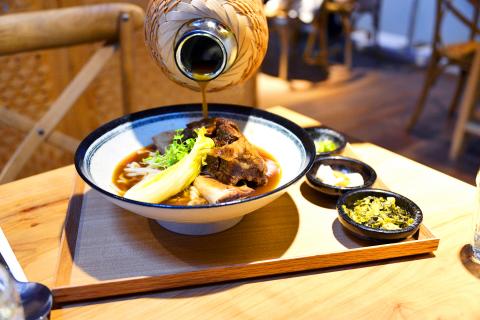
Photo: George Lee
The chefs are not shy about differentiating their cuisine from the norm. You almost think you know what to expect, being familiar with Asian-American fusion food, but the first dish arrives and throws your tastebuds an uppercut.
Beef short rib noodles (NT$780) are the restaurant’s signature dish. Six-day slow-cooked 425g bone-in short rib sits proudly atop a bed of thick, firm, tangy hand-pulled noodles, beside half a Chinese baby cabbage. The smoky, smooth broth is poured straight from a basket-like jar, evoking a rustic quality. The tender beef fell right off the bone as I bit into it — totally expected, but so satisfying every time.
The risotto (NT$420), dubbed “Local Champion,” exudes a familiar briny fragrance. Taitung rice, diced Taichung taro, pickled Miaoli mustard greens, sweet shrimp, scallops and squid are all cooked al dente in shrimp head broth and topped with chopped chives.

Photo: George Lee
The smell was reminiscent of the air in a fish market — I personally enjoyed that, although some might find it overwhelming.
I didn’t think I could be more impressed, but the dishes that followed proved otherwise. A curry of oxtail and beef cheek (NT$299), influenced by Japanese, Thai and South Asian cuisine, is braised in red wine and served alongside a garden of potatoes, crisp broccoli, bamboo and beef tomato. While its heat is mild for a curry, the intense flavor demands a healthy serving of white rice, which is dutifully provided.
The XO sauce linguine (NT$420), spicy but not too much so, is tossed with buttery pan-seared scallops and olive oil, mildly scented with garlic chips and fresh herbs. It’s assertive, forthright and a must-order for XO sauce fanatics.
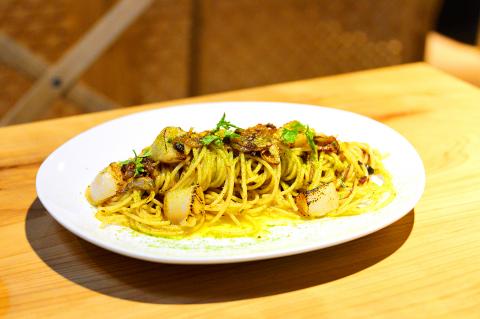
Photo: George Lee
Arguably the most distinctive dish is the mushrooms and squid (NT$320). Thick cuts of red and yellow bell peppers, mushrooms and squid rings, juxtaposed with golden-brown deep-fried burdock strips, are a piquant Western twist on the traditional Taiwanese three-cup sauce of rice wine, soy sauce and sesame oil. Eating this dish convinced me that three-cup sauce might just pair better with seafood.
The food is almost too rich and hearty, but then there’s the cool, refreshing No.1 Food Theater salad (NT$380). Boasting each day’s freshest produce, you will not recognize this salad the next time you have it. The dressing stood out to me — the mixture of peanut oil and honey oat vinegar cuts through every bite with fat and acidity.
Finally, for dessert, the chef’s special (NT$280) consists of French toast and caramelized banana laden with cream, perfumed with coconut butter and chili pepper and sprinkled with hazelnuts. I couldn’t have been happier to find such a harmony between the savory sweetness of the toast and the fiery chili pepper flakes.
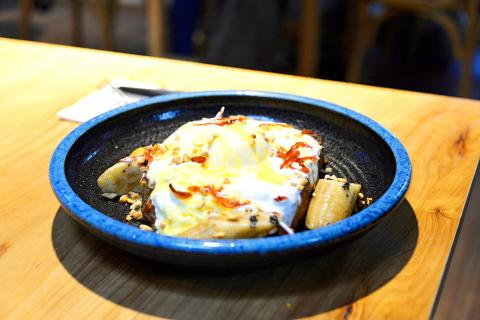
Photo: George Lee
The cooking at No.1 Food Theater is confident and whimsical, and the atmosphere is convivial. The chefs here really showcase how simple ingredients and homespun recipes, too, can have swanky flair.
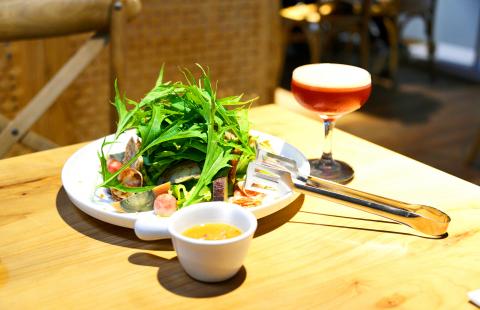
Photo: George Lee
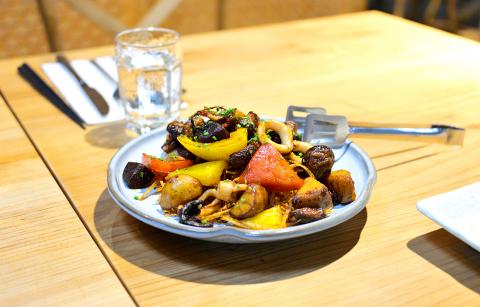
Photo: George Lee

We lay transfixed under our blankets as the silhouettes of manta rays temporarily eclipsed the moon above us, and flickers of shadow at our feet revealed smaller fish darting in and out of the shelter of the sunken ship. Unwilling to close our eyes against this magnificent spectacle, we continued to watch, oohing and aahing, until the darkness and the exhaustion of the day’s events finally caught up with us and we fell into a deep slumber. Falling asleep under 1.5 million gallons of seawater in relative comfort was undoubtedly the highlight of the weekend, but the rest of the tour

Youngdoung Tenzin is living history of modern Tibet. The Chinese government on Dec. 22 last year sanctioned him along with 19 other Canadians who were associated with the Canada Tibet Committee and the Uighur Rights Advocacy Project. A former political chair of the Canadian Tibetan Association of Ontario and community outreach manager for the Canada Tibet Committee, he is now a lecturer and researcher in Environmental Chemistry at the University of Toronto. “I was born into a nomadic Tibetan family in Tibet,” he says. “I came to India in 1999, when I was 11. I even met [His Holiness] the 14th the Dalai

Following the rollercoaster ride of 2025, next year is already shaping up to be dramatic. The ongoing constitutional crises and the nine-in-one local elections are already dominating the landscape. The constitutional crises are the ones to lose sleep over. Though much business is still being conducted, crucial items such as next year’s budget, civil servant pensions and the proposed eight-year NT$1.25 trillion (approx US$40 billion) special defense budget are still being contested. There are, however, two glimmers of hope. One is that the legally contested move by five of the eight grand justices on the Constitutional Court’s ad hoc move

Stepping off the busy through-road at Yongan Market Station, lights flashing, horns honking, I turn down a small side street and into the warm embrace of my favorite hole-in-the-wall gem, the Hoi An Banh Mi shop (越南會安麵包), red flags and yellow lanterns waving outside. “Little sister, we were wondering where you’ve been, we haven’t seen you in ages!” the owners call out with a smile. It’s been seven days. The restaurant is run by Huang Jin-chuan (黃錦泉), who is married to a local, and her little sister Eva, who helps out on weekends, having also moved to New Taipei